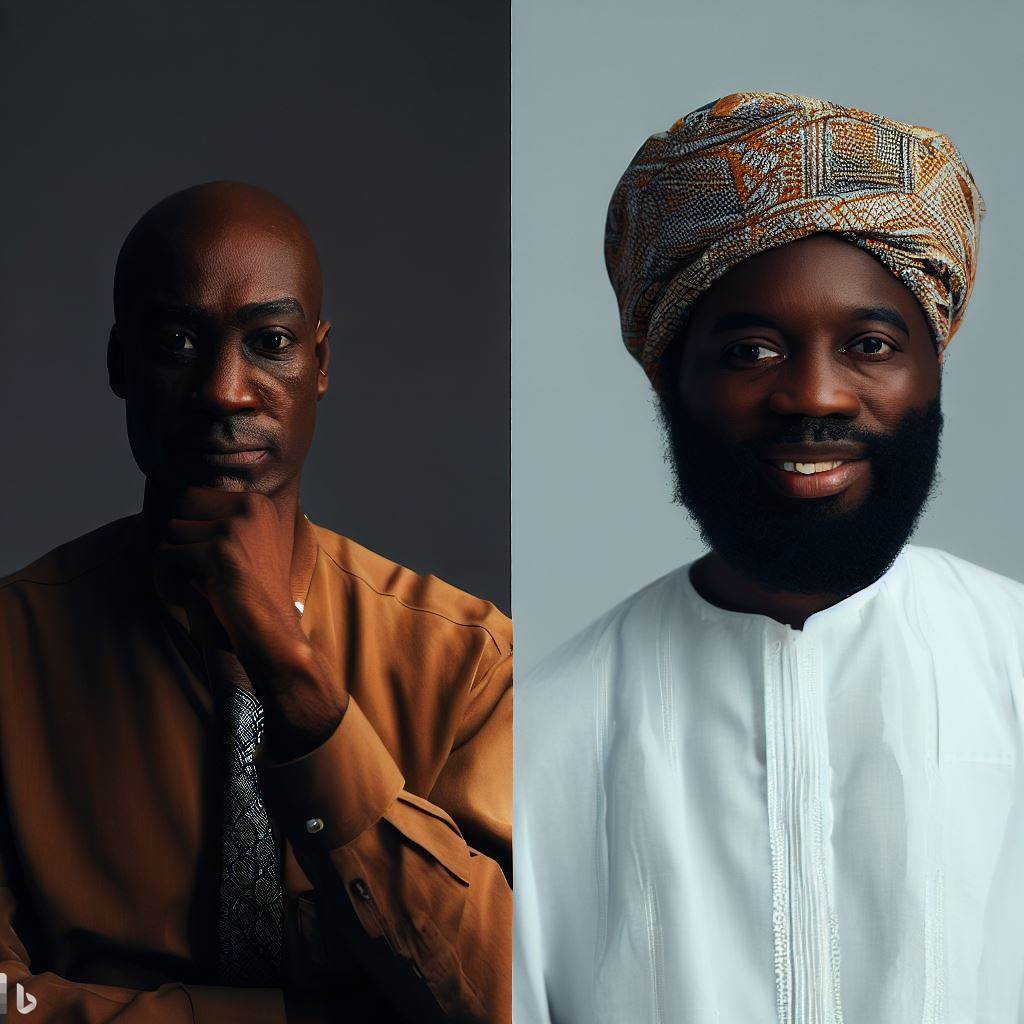Introduction
Nigerian scriptwriting practices are an essential aspect of the country’s vibrant entertainment industry.
With a rich cultural heritage and diverse traditions, Nigerian scriptwriters draw inspiration from their cultural roots to create captivating stories.
The influence of Nigerian culture is evident in the themes, characters, and dialogue employed in scripts.
Understanding the significance of cultural influence in Nigerian scriptwriting practices is paramount.
Cultural elements provide a unique identity and authenticity to the narratives, resonating with the audience on a deeper level.
They contribute to the preservation and celebration of Nigerian traditions, fostering a sense of pride and appreciation for their cultural heritage.
The thesis of this blog post asserts that cultural influence plays a critical role in shaping Nigerian scriptwriting practices.
Examining how cultural aspects impact script development, character portrayal, and storytelling techniques will provide valuable insights into the significance of culture in this art form.
By exploring the relationship between cultural influence and scriptwriting, we can appreciate the intricate connection between Nigerian cultural heritage and the entertainment industry.
In subsequent sections, we will delve deeper into specific examples of cultural influence in Nigerian scriptwriting practices, analyze the impact on storytelling, and demonstrate the broader implications for the Nigerian film and television industry.
Stay tuned for section 2, where we explore the incorporation of traditional Nigerian folklore in scriptwriting.
Historical Background of Nigerian Scriptwriting
- A Brief history of the Nigerian film industry (Nollywood): Nollywood, the Nigerian film industry, emerged in the 1990s and quickly became the second-largest film industry globally.
- Emergence of indigenous scriptwriting practices: The growth of Nollywood led to the emergence of indigenous scriptwriting practices that showcased Nigerian cultural influence.
- Influence of colonialism on Nigerian scriptwriting: The influence of colonialism is evident in Nigerian scriptwriting practices, as it fused Western storytelling with local traditions.
Read: Nollywood vs Hollywood: A Scriptwriter’s Perspective
Cultural Elements in Nigerian Scriptwriting
Language and dialects
- Usage of Nigerian indigenous languages in scripts
- Impact on audience reception and authenticity
Traditional values and beliefs
- Depiction of cultural norms, traditions, and customs
- Representation of rites, rituals, and ceremonies
Social issues and contemporary topics
- Addressing socio-political and economic challenges
- Reflecting societal preoccupations and aspirations
Scriptwriting in Nigeria encompasses various cultural elements that reflect the rich heritage and diversity of the country.
From the usage of indigenous languages to the portrayal of traditional values and the exploration of social issues, Nigerian scriptwriters play a crucial role in preserving, promoting, and shaping the cultural landscape of the nation.
Language and dialects
One prominent aspect of Nigerian scriptwriting is the incorporation of indigenous languages. Scripts often include dialogues and conversations in languages like Yoruba, Hausa, Igbo, and many more.
This not only adds authenticity but also enhances the cultural immersion for the audience, making them feel connected to their roots.
Furthermore, the usage of indigenous languages in scripts has a profound impact on audience reception. It evokes a sense of nostalgia and identification among viewers who understand and speak these languages.
This connection helps in building a stronger emotional bond between the audience and the story being portrayed on screen.
Traditional values and beliefs
Nigerian scriptwriters also focus on depicting cultural norms, traditions, and customs in their scripts.
Through compelling narratives, they highlight the importance of respect for elders, communal living, family ties, and various other societal values.
By showcasing these elements, scriptwriters not only preserve these traditions but also educate the audience about their significance.
In addition to cultural norms, scriptwriters also represent rites, rituals, and ceremonies in their scripts.
Whether it’s a wedding, a naming ceremony, or a religious festival, these portrayals provide a glimpse into the vibrant and diverse cultural practices of Nigeria.
They serve as a reminder of the nation’s rich heritage and foster a sense of pride among the audience.
Social issues and contemporary topics
Nigerian scriptwriters actively address socio-political and economic challenges through their scripts.
They tackle issues such as corruption, poverty, gender inequality, and political unrest, shedding light on the hurdles faced by Nigerian society.
By doing so, scriptwriters raise awareness and encourage dialogue on these crucial matters, playing a vital role in societal progress.
Moreover, Nigerian scriptwriters reflect societal preoccupations and aspirations in their scripts.
They capture the dreams, desires, and struggles of the people, creating characters and storylines that resonate with the audience.
Whether it’s the pursuit of education, the quest for social justice, or the longing for a better future, these themes tap into the collective consciousness and inspire the audience.
Basically, cultural influence in Nigerian scriptwriting practices is evident through the incorporation of indigenous languages, the depiction of traditional values, and the exploration of social issues.
These elements not only enrich the storytelling experience but also serve as a medium for cultural preservation, education, and societal reflection.
Nigerian scriptwriters are instrumental in shaping the cultural landscape and promoting a deeper understanding and appreciation of Nigerian heritage.
Read: Nigeria’s Top Music Festivals and the Role of DJs
Influence of Nigerian Literature and Folklore
Adaptation of literary works into scripts
Nigerian scriptwriters often draw inspiration from the rich literary tradition in the country. They adapt famous novels, plays, and poems into scripts, bringing these beloved literary works to life on the screen.
This practice not only helps keep the literary heritage alive but also provides a fresh perspective to the stories.
Adapting literary works into scripts allows scriptwriters to explore and depict complex characters and themes, making Nigerian literature more accessible to a wider audience.
It also provides opportunities to showcase the talents of Nigerian actors and actresses who can bring these beloved characters to life.
Furthermore, by adapting literary works into scripts, scriptwriters can introduce Nigerian literature to a global audience.
Through film and television, these stories can transcend borders, showcasing the depth and diversity of Nigerian storytelling.
Integration of folklore and mythological elements
Folklore plays a crucial role in Nigerian culture, and scriptwriters recognize its power to captivate and engage an audience.
They incorporate folklore and mythological elements into their scripts, infusing traditional storytelling techniques with modern narratives.
By integrating folklore and mythological elements into scripts, scriptwriters not only entertain but also educate the audience about Nigerian traditions, beliefs, and values.
These stories often convey moral lessons and reflect the cultural identity of the Nigerian people.
The inclusion of folklore and mythological elements also adds depth and authenticity to the narratives.
It creates a unique blend of realism and fantasy, allowing viewers to immerse themselves in the rich cultural heritage of Nigeria.
Amplifying Nigerian cultural heritage through storytelling
Storytelling is an integral part of Nigerian culture, and scriptwriters play a crucial role in preserving and amplifying the country’s cultural heritage.
Through their scripts, they showcase the diversity of Nigerian traditions, languages, music, and dance forms.
By highlighting Nigerian cultural practices in their scripts, scriptwriters create a sense of pride and identity among the Nigerian audience.
Viewers can see themselves and their traditions represented on screen, fostering a deeper connection to their cultural roots.
Moreover, amplifying Nigerian cultural heritage through storytelling helps challenge stereotypes and misconceptions about the country.
It allows the audience to appreciate the richness and complexity of Nigerian culture, promoting a more nuanced understanding of the nation.
Essentially, Nigerian scriptwriting practices are heavily influenced by the country’s literature and folklore.
Scriptwriters adapt literary works into scripts, integrating folklore and mythological elements, and amplifying Nigerian cultural heritage through storytelling.
These practices not only contribute to the preservation and promotion of Nigerian culture but also provide unique and engaging narratives for audiences around the world.
Read: Scriptwriting Schools: Best Training in Nigeria
Collaboration of Scriptwriters and Filmmakers
Collaboration between Scriptwriters and Directors/Producers
The collaboration between scriptwriters and filmmakers is crucial for the success of a Nigerian film.
The scriptwriter’s vision must align with the director’s interpretation to effectively convey the story.
This collaboration enhances the story’s authenticity and enables the filmmakers to bring it to life.
Balancing Cultural Authenticity with Commercial Viability
When scriptwriters collaborate with filmmakers, they face the challenge of balancing cultural authenticity with commercial viability.
Nigerian scriptwriters aim to showcase their rich culture while appealing to a global audience.
They strive to maintain the integrity of their cultural practices while still creating films that can generate revenue.
Impact of Cultural Influence on Film Aesthetics and Storytelling Techniques
Cultural influence plays a significant role in shaping film aesthetics and storytelling techniques in Nigeria.
Scriptwriters integrate cultural elements such as indigenous languages, traditional attire, and customs into their scripts.
These cultural influences bring uniqueness and originality to Nigerian films, setting them apart from other global productions.
Filmmakers capture the essence of Nigerian culture through cinematography, highlighting vibrant landscapes and traditional architecture.
Storytelling techniques like oral tradition and folklore are also incorporated to preserve the cultural heritage.
By doing so, films become a tool for cultural preservation and serve as a reflection of Nigerian society.
The impact of cultural influence on film aesthetics goes beyond visual representation.
It also influences the soundscape of films, with traditional music and rhythms being integrated into the soundtrack.
This auditory experience enhances the authenticity of the storytelling and immerses the audience in the Nigerian culture.
Moreover, cultural influence shapes the narrative structure of Nigerian films.
Storylines often revolve around societal issues, family dynamics, and moral values deeply rooted in Nigerian culture.
By presenting these stories, Nigerian scriptwriters strive to foster cultural pride and prompt meaningful conversations.
The collaboration between scriptwriters and filmmakers allows for the exploration of complex themes and perspectives.
It encourages a dialogue between cultural traditions and contemporary issues faced by Nigerians.
Through this collaboration, Nigerian films become a platform for social commentary and cultural exchange.
In essence, collaboration between scriptwriters and filmmakers is vital in Nigerian scriptwriting practices.
This collaboration ensures the integrity of cultural authenticity while also appealing to a wider audience.
Cultural influence permeates film aesthetics and storytelling techniques, reflecting Nigerian society and preserving cultural heritage.
Through collaboration, Nigerian films become a medium for cultural pride, social commentary, and global recognition.
Read: Income and Opportunities for Scriptwriters in Nigeria

Challenges and Opportunities in Culture-Based Scriptwriting
Cultural Appropriation and Misrepresentation
- Lack of understanding and research can lead to cultural appropriation and misrepresentation in scriptwriting.
- Writers must strive to accurately represent cultures and avoid stereotypes or offensive portrayals.
- Collaborating with cultural consultants or experts can help ensure authenticity and avoid unintentional harm.
- Respecting cultural boundaries and seeking permission when using cultural elements is crucial.
Navigating the Fine Line Between Cultural Sensitivity and Creativity
- Balancing cultural sensitivity and creative storytelling can be challenging for scriptwriters.
- It is important to do justice to cultural values while also creating engaging narratives.
- Scriptwriters should be open to feedback and criticism from cultural communities to improve their work.
- Exploring different cultural perspectives can enhance creativity and provide unique storytelling opportunities.
Expanding Global Reach Through Cultural Diversity
- Culture-based scriptwriting allows for the inclusion of diverse voices and stories from different cultures.
- Incorporating cultural diversity can attract audiences from various backgrounds and increase global reach.
- Cultural authenticity and representation can foster a stronger connection between scripts and viewers.
- Embracing cultural diversity in scriptwriting can lead to a more inclusive and representative entertainment industry.
In short, culture-based scriptwriting presents both challenges and opportunities for scriptwriters.
It is crucial to avoid cultural appropriation and misrepresentation by conducting thorough research and collaborating with cultural consultants.
Navigating the fine line between cultural sensitivity and creativity requires open-mindedness and a willingness to learn from cultural communities.
Expanding global reach can be achieved by incorporating cultural diversity, which enhances authenticity and attracts a broader audience.
By embracing cultural diversity in scriptwriting, we can create a more inclusive and representative entertainment industry.
Case Studies: Successful Cultural Influenced Scripts
Analysis of notable Nigerian films showcasing cultural influence
- “The Wedding Party” – a romantic comedy that incorporates Nigerian wedding traditions and cultural norms.
- “October 1” – a historical thriller that explores the impact of colonialism on Nigerian society.
- “Lionheart” – a drama that addresses gender roles and the challenges faced by women in Nigerian society.
Discussion on critical acclaim and commercial success of these scripts
The three movies mentioned above have received critical acclaim, both nationally and internationally.
They have won numerous awards and have been praised for their authentic portrayal of Nigerian culture.
In terms of commercial success, these films have been box office hits, both domestically and abroad.
They have attracted a wide audience and have been highly profitable ventures.
Publish Your Professional Profile, Business or Brand
Showcase your expertise, gain trust, and boost visibility instantly on Professions.ng.
Publish NowLessons learned for aspiring scriptwriters
- Research and immerse yourself in Nigerian culture to accurately represent it in your scripts.
- Understand the importance of balancing cultural authenticity with universal themes that can resonate with a global audience.
- Explore unique and lesser-known aspects of Nigerian culture to offer fresh perspectives.
- Pay attention to details such as language, attire, and traditions to create an immersive and believable world.
- Collaborate with a diverse team of creatives to ensure a well-rounded portrayal of Nigerian culture.
- Be aware of the social and political context in which your script is set to add depth and relevance.
- Be open to feedback and criticism, and continuously refine your script to make it the best it can be.
By studying successful examples of cultural influenced scripts in Nigerian cinema, aspiring scriptwriters can gain valuable insights and inspiration for their own work.
Understanding the significance of cultural influence and its impact on scriptwriting practices is crucial in creating authentic and compelling stories that resonate with audiences worldwide.
Conclusion
Recap of the cultural influence on Nigerian scriptwriting practices
Nigerian scriptwriting practices are heavily influenced by the country’s rich cultural heritage.
These cultural elements manifest in the themes, characters, and storytelling techniques employed in Nigerian scripts.
Importance of preserving and promoting cultural diversity in scripts
Preserving and promoting cultural diversity in scripts is crucial for Nigerian scriptwriting.
It helps to showcase the uniqueness of Nigerian culture, educate audiences, and foster a sense of pride and identity among the people.
Final thoughts on the future of Nigerian scriptwriting and its cultural impact
The future of Nigerian scriptwriting holds great potential. By embracing and showcasing cultural diversity,
Nigerian scripts can reach a wider audience globally, bridging gaps and promoting intercultural understanding.
In summary, the cultural influence on Nigerian scriptwriting practices cannot be overstated.
Nigerian scripts are a reflection of the country’s diverse cultural heritage, and preserving this diversity is essential for the growth and development of Nigerian scriptwriting.
As the industry continues to evolve, the cultural impact of Nigerian scripts will undoubtedly play a significant role in shaping the future of Nigerian cinema.




